by Ali Symons (with credit to Abby Fox!)
Ever since I jumped into this Virginia fracked-methane-gas pipelines fight back in early April 2018, I’ve wanted to go see the path of the pipelines with my own eyes. I had so wanted to visit the Terrys and Nutty in their tree sits and monopod. But the opportunity never presented itself.
I knew that having that firsthand experience – being in the place, utilizing all of my senses together at once – would be powerful and would enhance my ability to advocate for the cause. I also needed to meet the locals being affected, as well as fellow activists on the frontlines. The strength of our movement is dependent on the personal network and connections that we build with each other.
With just a few weeks left of summer vacation, and needing to get the kids away from screens and outdoors with nature, I decided it was now or never. So, I planned a trip to take in the Mountain Valley Pipeline “Destruction Tour” in Giles and Montgomery Counties, then camping at the Limperts’ in Bath County, to experience their beautiful property that is in the path of the Atlantic Coast Pipeline.
My friend, Abby Fox, was the only fellow Northern Virginian crazy enough to join us on this adventure; neither of us are particularly experienced outdoorsy types. In a Honda Odyssey minivan, we loaded all our city slickers’ gear (i.e. way too much stuff than we needed) for a long weekend adventure in the Appalachian Mountains of Southwest VA.
Arriving in Pembroke VA
Our first destination was Doe Creek Farm, in Pembroke VA, whose owner, Georgia Haverty, was gracious enough to invite the four of us to stay in her beautifully renovated 1880s farmhouse. We had a welcoming party waiting to greet us at the farm, with a dinner of Southern fare. The kindness and generosity of strangers were overwhelming; with their homes under threat, it was striking that they should be the ones treating us. After all, we had come down to learn what we could do to help them.
We arrived right around dusk and the twilight glow displayed the farm’s natural beauty to perfection. As I scanned the view before me my eyes are drawn to the brown scar that is the Mountain Valley Pipeline path going straight through Doe Creek Farm. I felt a tinge of sadness as it dawned on me why we were invited there.
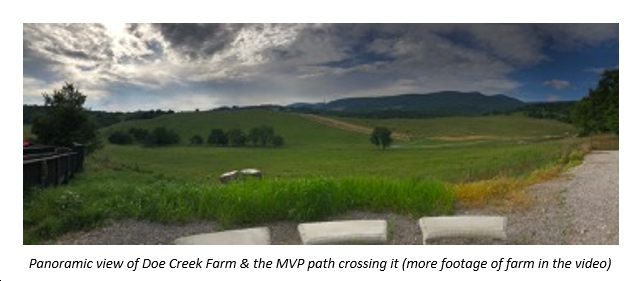
Doe Creek Farm has an apple orchard and some cattle. It is also a wedding venue. And who wouldn’t want to have a wedding here? It’s just stunning!
Georgia is very proud of her business success and her beautiful property. She pointed out to us that she is doing exactly the kind of business that rural, job-scarce counties like hers love to tout as the next wave of booming, sustainable agritourism. Her farm was one of the first in the area to go into the wedding venue business, she explains, and now many other farms in the area are getting on the wedding venue bandwagon too. Her daughter, Allison, runs the successful wedding business, but has recently been losing clients once they learned that the pipeline is going through the farm. The house itself, and some of the other structures on the property, are a piece of history. In fact it is listed on the National Trust’s Register of Historic Places. But being a shining jewel in the Giles County crown is not enough to stop the pipelines, and the undue influence they have, to take it all away from her and the county she loves.
Georgia is a study in contrasts – she is a strong, tireless fighter, quick to smile and laugh. She could not have been more friendly or welcoming. She was more than happy to share her story with us, as well as her first-rate fresh beignets that she made for our breakfast. But she’s also clearly stressed, and frankly exhausted, by the never-ending worry and strain, wondering what will happen to her family business, home and land.
Every day since mid-July, when pipeline workers started razing a long, ugly, buzz-cut strip of hill where her cattle graze, Georgia has been on high alert, anxiously calling her lawyer regularly to report any concern about errors and hazards she spots, whether it’s the workers operating outside of their allotted hours, or the cows in distress if they’re separated from each other in all the confusing and loud noise and activity.
The MVP Destruction Tour
It was an early morning start for us, especially after the 6-hour journey just the day before. But it was a good thing, as I was able to capture some great early morning video footage of the farm with all the birds chirping, the dewiness of the morning air mixing with the first sunlight, and the misty clouds encircling the surrounding mountains.
After a great breakfast, the party started out on our tour. Our guides were made up of several local pipeline activists and those directly affected by the Mountain Valley Pipeline. A pipeline activist and hydrologist, Tom Adams, rode with us in our car so that he could be our personal guide, pointing out and explaining anything noteworthy to us along the way. He was the perfect person to explain what the pipeline will do (is doing) to the hydrology and geology of the area.
As we drove out of the farm property onto the main road, we passed by the first direct view of the pipeline path that we saw on our arrival the evening before. That first view was jarring. The first thing that struck us was how VERY steep the slopes are on this mountainous terrain. It is impossible to gauge from photographs and videos the gradient of these slopes. This was one of the things I wanted to be able to see with my own eyes.
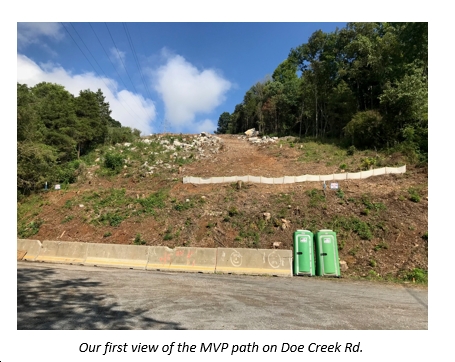
Our first stop on the tour was Brush Mountain, where Emily Satterwhite, a Professor of Appalachian Studies at Virginia Tech, had locked herself to a digger for 12 hours earlier this summer. We passed through a small town call, Newport, on the way to Brush Mountain. The Mountain Valley Pipeline is passing straight through this town. It is a very picturesque town where nature seems to have gained the upper hand; until the pipeline came through. The point where the pipeline is crossing through this community looked particularly precarious. It comes down a very steep slope on one side, will tunnel under the main road of the town, and then up another steep slope the other side. This just looks like a recipe for disaster on multiple fronts whether from erosion, landslide, or explosion; especially because it is in very close proximity to people. This is an earthquake- and sinkhole-prone region.
It is difficult to put into words how devastatingly beautiful this area is as we wound our way through the mountains and valleys. I can confirm that the locals have been faithful in their description of how pristine their natural environment is. They were not exaggerating. From the forests to the rivers, the mountains to the valleys, the sights that greet you would make even an atheist wonder if there might be a higher divine power after all. It is a wonder. Like a masterpiece, but alive and all around you. So much breathtaking beauty it will make your heart ache. My mouth hung open in awe at every turn of the road. How has it taken me this long to get here?
Up on Brush Mountain, we were met by several more people: Emily Satterwhite, Jammie Hale (a local landowner affected by the MVP), Robin Scully (a local artist and activist), and Jason Shelton of Mountain Valley watch. After parking in someone’s driveway (with their permission), we made our way along a path through the Jefferson National Forest to the edge of the Mountain Valley Pipeline path. The air is cool and comfortable up here in this higher elevation, and with all the lush tree cover, in stark contrast to the oppressive heat and humidity we’ve been used to most everywhere else on this planet this summer. Robin stopped part way along this path to tell us about the art installation painted onto the tree trunks as a way to protect the forests from being destroyed by the MVP. (See full explanation in the video: https://youtu.be/lxSbnUOK88k)
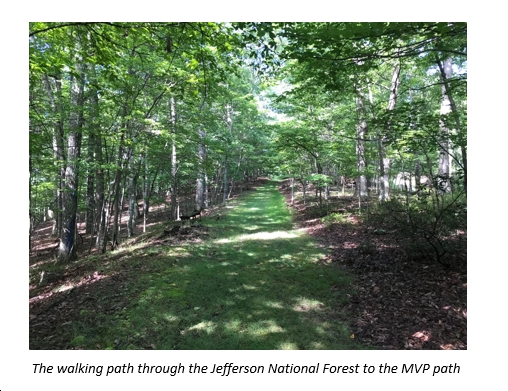
On reaching the Mountain Valley Pipeline path, and as we made our way across it, we immediately felt the unforgiving heat and blinding sun on that naked mountaintop the moment we stepped out from under the tree covers of the forest. Without the trees, it was almost unbearable. How do the pipeline construction workers withstand it, while doing such strenuous grudge work on steep terrain? Why would anyone prefer this laborious, transient, work under grueling conditions over installing solar panels or any other clean energy related work that would provide long term work with good hours and better pay?
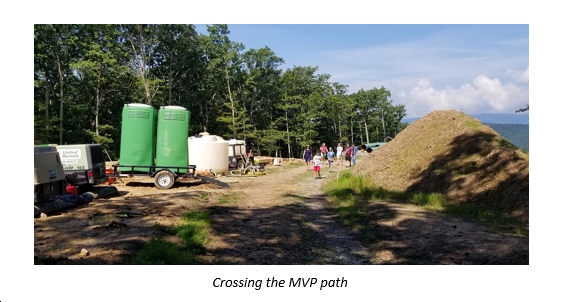
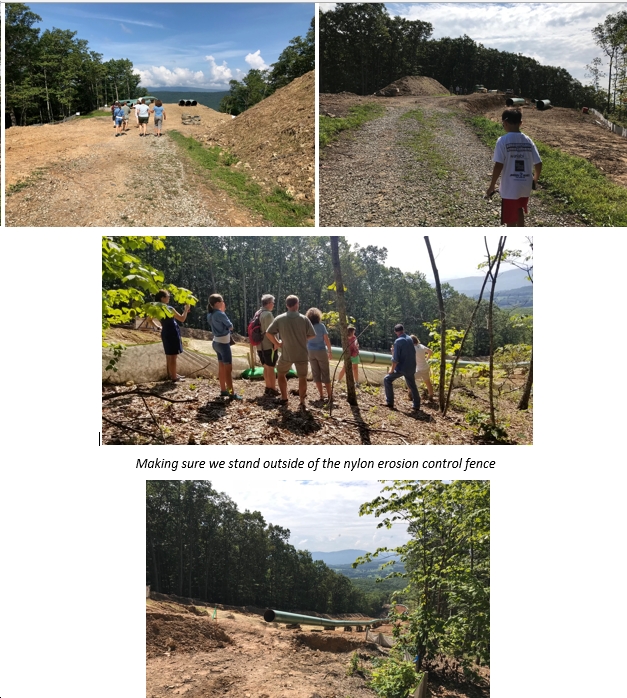
Our visit to Brush Mountain also afforded us our very own experience with the Mountain Valley Pipeline’s private security that many of us have heard stories about from locals who have been living with their intimidation tactics for years now. As soon as we came out onto the pipeline path, we spotted a couple of security men (dressed more like construction workers) hanging out by some of the equipment. We were told by our guides that they are likely to be on the phone calling for back up now that they have sighted us up here. As we surveyed the construction site, making sure to abide by the strict boundaries and rules, the security men followed us at a distance. At one point, while we were standing beyond the flimsy nylon erosion control fence to one side of the construction path, two security men seem to just appear out of nowhere and were facing away from us as if they were looking at something else. One of the guides pointed out the iPad that was hanging on the back of one of them informing me that they are likely to be videoing us. Later, when we were making our way back to our cars, three Mountain Valley Pipeline-hired private security vehicles passed us heading towards the pipeline construction site. The driver of the first vehicle stopped and spoke to our group. As he was about to continue on he said, “… I just want to thank you all for the job security …. And let me just take a picture of you.” Then he took a photo of us with his cell phone and drove on.
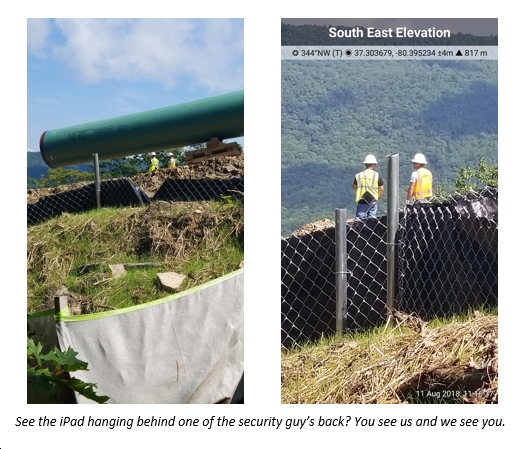
The interaction left me feeling uneasy, given the fact that I had my two children with me. On the surface, the exchange was almost pleasant and cordial. But there were thin veils of passive aggressive intimidation, the kind you might imagine mafia bosses telling their victims they will “protect” them from “other dangers” so long as they keep paying up. When I would hear stories of similar or worse instances of locals and activists’ run in with law enforcement and the Mountain Valley Pipeline’s private security, there’s a part of me that wouldn’t quite believe them. Not because I thought they were lying or that the events didn’t happen. But in the back of my mind, I would leave room for doubt. Maybe there were misunderstandings or misinterpretations of actions or words. Maybe it’s not as drastic as it would seem. After all, don’t we live in the greatest democracy in the world where freedom of speech and civil rights of citizens are sacred? Isn’t that daily what’s drummed into our heads? If I am to accept that these kind of things happen in the U.S., then I would also have to accept that we don’t live in a country where all are equal under the law and justice is upheld. And THAT is the most disturbing aspect of all this. So, when it happened to me, my children, and people I know, it thoroughly shook me. And this was just the tip of the iceberg. Others have experienced way worse. But it was enough for me to get a glimpse of the hostile intent that was undeniable.
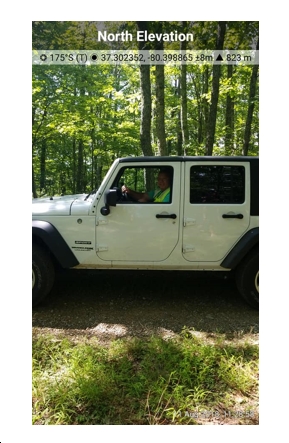
The last stop on the tour was for a picnic lunch in a barn on the property of one local landowner, Chris Hutton. The pipeline cuts through the entrance of the driveway onto his property, constantly being obstructed by construction vehicles of various sorts. Just coming and going to and from his own property is a daily chore for Chris. Several other local pipeline activists joined us for lunch and enriched the conversation with their insights and first hand experiences in a variety of aspects of the pipelines. Some profound discussions on the state of our democracy and government were had in that ramshackle barn, where a rattlesnake and a black snake were hanging out before our party disturbed them.

“No Pipeline Summer” Camp at the Limperts’ in Bath Co. – In the path of the Atlantic Coast Pipeline
Next stop: the Limperts’ in Bath Co.
Two of our pipeline activist friends from the Blacksburg area, Trish and Rick, decided to join us on this camping trip. Though just 2.5 hours north of Pembroke VA the vegetation and climate in this part of the Appalachia is already quite different; much cooler and slightly more temperate. Having arrived quite late, and fast losing sunlight, we didn’t have much time to do anything else but to set up our sleeping situation and eat dinner.
The next day was our one and only full day at Camp Limperts. Our hosts informed us that the hiking tour to Miracle Ridge would step off at 10am. If you decide to come camp at the Limperts – and they say they are taking campers for a few more weeks until mid-September – the highlight of your visit will likely be Bill’s personalized guided tour of Miracle Ridge, where he will show off his love and knowledge of trees and land. It was already shaping up to be a beautiful day with some cloud cover and the hint of rain to come later, not a terrible thing this time of year. The hike took us up and down some steep paths and onto narrow ridges. We were completely surrounded by large old growths of maples, oaks, and others. The grounds were covered in lush and diverse varieties of mosses and mushrooms. I had never seen such a variety of mushroom on one short hike in my life. Such healthy forest floor is a good indication that the air quality here is particularly high as mosses and lichens are very sensitive to air quality. The hike concludes with a visit to the giant Sugar Maple the Limperts call “Ona” – she is approximately 260 years old and 15-feet wide in circumference. This tree will most likely be sacrificed if the ACP comes through here.
Back at the Limperts’ house, visitors were invited to sit on their second story, covered deck to relax, chat, and take in the magnificent vista of the surrounding mountains and forests. It’s the kind of view few people rarely get to enjoy in an increasingly suburbanized and urbanized Virginia. You can see the wingstem flowers all over the ground below. You hear the sound of singing birds – Goldfinches, Woodpeckers, Towhee, Orioles and Indigo Buntings. The visual delights include not one, but two mountains: Little Mountain straight ahead and Jack Mountain on your right. This is what the world looks like when you live adjacent to the George Washington National Forest. It’s hard not to appreciate how the incessant humidity cling tightly to us this time of year isn’t here. Here, you find yourself calmer, more relaxed, sitting in this cooler, cleaner air, at least 10+ degrees below the summer swelter of Northern Virginia.
The Limperts are ordinary people who don’t claim themselves to be environmentalists nor particularly civically engaged prior to when the Atlantic Coast Pipeline came barging into their lives. The retired couple enjoys ordinary past-times in this modest place: Bill plays guitar, watches movies and sports, while Lynn gardens and enjoys PBS mysteries and nature shows.
Their run-in with the Atlantic Coast Pipeline and its developer, Dominion Energy, began in February 2016, when they learned that their property is in the direct path of the pipeline. Since then, their quiet and peaceful life has been upended by intense back-and-forth with various state government regulatory agencies, multiple meetings with lawyers, and frequent drives to attend public hearings in Richmond and other parts of the Commonwealth. This summer, they took their fight against the Atlantic Coast Pipeline to a new level by coordinating with the Chesapeake Climate Action Network to open up their property to campers. Since the end of July, they have been welcoming and educating curious visitors from Virginia, North Carolina, Pennsylvania and beyond about what may befall their piece of paradise if the destructive and unnecessary Atlantic Coast Pipeline prevails. On this particular weekend, we were the beneficiaries of their generosity where we got to stay for a day and two nights.
The Limperts don’t mince words when you ask them how they’re doing these days. “We feel banished from paradise,” Bill told us. They are resolved to stand up for their property, against what they perceive as the two main threats to their home: the energy companies and the state permitting the infringement on their property. “We don’t want them to get away with it without a fight,” Lynn said. And they believe they still have a chance to stop it.
But even their high hope and endless efforts have its limits. The Limperts say that if the energy companies have their way and start cutting trees on their 3,600-foot tall Miracle Ridge, they have decided that, at that point, they will give up the cause and decamp full-time to their other home in Smithsburg, Maryland.
Asked what most galls them about the prospect of losing the value of their land and seeing the wildlife – trees, bears, coyotes, birds, bees, fish – irrevocably destroyed by this project, Lynn said it was difficult to give just one major cause for alarm when there are several. What is most troubling to her, she said, is that private property can be taken by eminent domain even when there is no tangible local nor national economic benefit; and that the destruction to the source of fresh clean water could mean the loss of people’s livelihoods, many of whom are unlikely to have any backup plan if their home or business are lost to the pipelines.
Bill, too, had more than one frustration:
“It’s the constant lies and deceptions from Dominion Energy and the government in acquiescence. I think they’ve all consistently broken the law,” he said. “I can’t believe how government has acquiesced to these companies. It’s the transfer of wealth, actually the theft, from average Americans to Dominion and other shareholders, aided and abetted by the government. Yes, Virginia has regulations and laws to protect us,” he said, “but it’s a smoke screen of regulation and there’s always an escape clause [for the energy companies]. It’s such a shock that all these laws are written in their favor and they still break them.“
While the Limperts are not certain of success, they say they are energized by the united community of pipeline opposition, the sustained support of many friends, allies and visitors. “I don’t think they expected this much fight from people,” Lynn said. “They are so used to getting their way.”
If energy companies like Dominion Energy thought they could roll over residents’ rights without doing battle, they have underestimated people like Bill Limpert, who is no novice when it comes to figuring out tricky environmental regulatory issues. He use to work for the Maryland Department of the Environment for most of his career specializing in water pollution issues and inspecting sites to see if they complied with the law.
As we waved goodbye and drove away the next morning to head back home to Northern Virginia, I was filled with a sense of gratitude and renewed purpose. There had been something missing from my advocacy up to this point, and now that missing piece had been found. Now I understood why I had to come. I needed to bear witness. I am now a witness of this crime that is being committed against our land, water, trees, creatures, mountains, people, and the earth.
To learn more about the Virginia pipeline resistance saga, check out the podcast “End of the Line”, https://soundcloud.com/pipelinepodcast , or find it on iTunes.
You can also help support the production of this podcast by donating at: https://www.facebook.com/donate/227708491269720/
To support activists on the frontlines fighting the MVP, you can donate to: https://actionnetwork.org/fundraising/donate-now-to-support-the-fight-against-the-mountain-valley-pipeline?source=direct_link&
To help the Limperts protect their land from the ACP, please donate at: https://www.facebook.com/donate/1026994804136338/



 Sign up for the Blue Virginia weekly newsletter
Sign up for the Blue Virginia weekly newsletter








